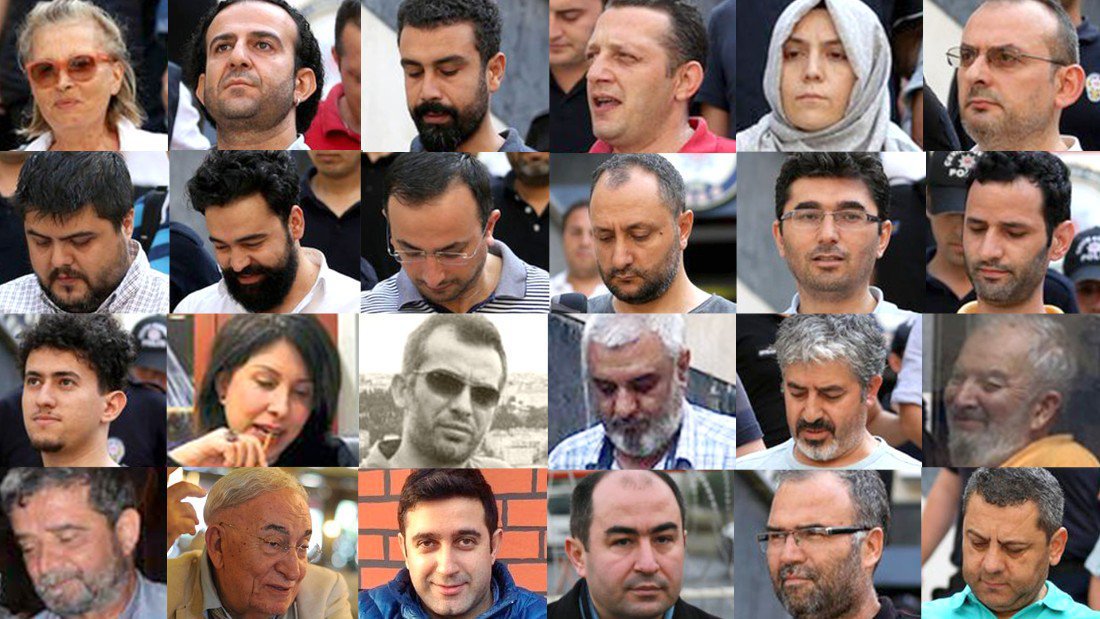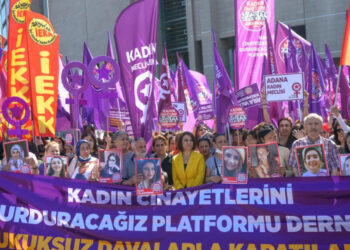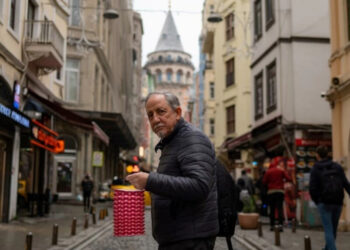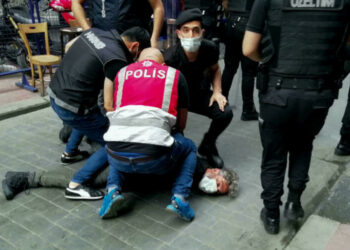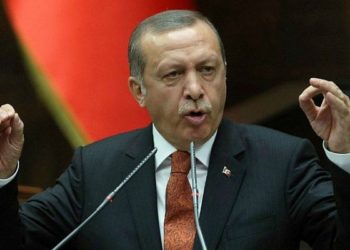Atilla Tas is a former Turkish singer who likes to make fun of himself. His self-humiliating jokes earned him hundreds of thousands of followers on Twitter, a medium that he also used to mock Turkish officials.
“If you prosecuted me over Ham Cekelek, it would have made more sense,” Mr. Tas, who became a columnist in the past few years, quipped during the trial on Monday. Ham Cekelek is Mr. Tas’ widely mocked song.
“Turkey now jails more journalists than any other country. 1/3 of all imprisoned journalists in the world are being held in Turkish prisons,” the Amnesty International said in a statement on Sunday.
On Monday, the same country saw a trial hearing in which more than two dozen journalists had a rare moment of chance to defend themselves against brazen charges ranging from terrorist activities to espionage, from leaking highly classified state information to simply engaging in wrongdoing.
After 8 months of detention, 26 detained journalists and one who was released pending trial first time appeared at an Istanbul court to face accusations related to the failed coup attempt last summer.
The majority of journalists were detained in the aftermath of the putsch and would face up to 15 years in jail if convicted of terrorism and coup-related charges.
Among defendants, Mr. Tas, a social media phenomenon with 1.7 million followers on Twitter, offered a stunning rebuke to charges he deemed politically-motivated.
As if in a song concert, Mr. Tas started his defense by imitating a microphone sound test, put on a brave face during his defense.
His conversion to journalism speaks to the profound change in Turkey’s transformed world of activism and public-spirited fervor that galvanized civil rights groups in aftermath of Gezi Protests in 2013.
Mr. Tas’ propel to national fame came in the late 1990s with a number of blockbuster songs that still remain fresh in memory.
He became a social phenomenon during the notorious corruption investigation that implicated President Recep Tayyip Erdogan‘s family and his close associates.
He weaponized Twitter as a social instrument to galvanize public anger against widespread corruption scandals that engulfed Mr. Erdogan and his government. It was enough to land him on the government’s radar and the list of its enemies.
His first thrust to the media landscape in 2015 was met with skepticism as well as cynicism. For whatever acclaim he earned for his thousands of retweeted and well-articulated tweets on social media, writing a column was a matter of different order.
To the loyal readers and observers, it was his unwavering standing against growing authoritarianism of President Erdogan mattered the most, not a textual analysis of everything he wrote.
But his satirical tone, social messages and astute handling of his themes offset his amateurishness for commanding the journalistic prose.
Even during the hearing, Mr. Tas never lost his dismissive, cynic and satirical tone in the face of what he said ludicrous charges that portrayed him as “a member of a terrorist organization.” His defense was a combination of resolution, defiance and elegant satire.
He called for recusation of the judge who ruled for his arrest from the trial, a demand dismissed by jury and the court justice.
He rejected coup-related and terrorism charges in candid terms. When asked about his profession, he said he was a pop singer, now an imprisoned journalist.
“I had a modicum of trust in the rule of law during my way here. When I saw you, last remnants of my faith in law were gone,” he railed against the way proceedings were taking place, expressing his lack of trust in the rule of law after arbitrary arrests.
Mr. Tas wrote for Meydan newspaper, which was shut down by authorities in the aftermath of the failed coup. The daily was known to be affiliated with the Gulen movement with which the pop star had no connection.
But it is enough for someone to work in a Gulen-affiliated school, newspaper or a company to end up in jail in Turkey’s environment of anti-Gulen frenzy.
For the government, having a bank account in Gulen-linked Bank Asya, or a smartphone app named ByLock, or sending children to schools believed to be affiliated with Gulen movement are regarded as elements enough for the prosecution of someone.
The end result is detention of more than 100,000 people, including judges, generals, teachers, police officers, engineers, and financial experts. Half of the detained remain in jail pending their trials.
Mr. Tas rejected the above-mentioned links.
“I never used ByLock, Eagle. I heard of them with this trial for the first time. I do not have any account in Bank Asya. I never stayed in their [Gulenist] dormitories. I’m a Muslim but I do not perform prayer,” he said, explaining that he had no connection to the Gulen movement.
On terrorism charges, he was less reserved and rejected accusations, viewing them as insults for someone who was wounded in a fighting during his military service.
“The only organization I became a member is Republican People’s Party (CHP). And I’m proud of that,” he told the court. “I served as a soldier in Southeast and suffered an injury in one of my legs. I saw my friends died. I have been living for 25 years with a bullet in one of my legs. Now they call me a terrorist. It really touches me.”
His longing to see a proper conduct of the judicial process, restoring justice is so desperate that he said he felt he was like in Franz Kafka’s The Trial novel.
“I’m here because my tweets seemed to infuriate some people. If I knew that I was living in a Banana Republic, I would have never tweeted,” he said about his critical tweets. “I didn’t know that criticizing government was a terrorist activity,” he added.
“What I get this from this indictment is that if you criticize the president, it means you act within the domain of terrorist groups.”
He also rejected forming a terrorist group with other journalists on trial, majority of whom he said he saw first in the courtroom.
Other journalists Ahmet Memis and Abdullah Kilic also rejected charges of terrorism.
“I was the one who got the lowest salary with 2,000 TL in the daily. Yet I’m the only one who is being tried,” Cihan Acar, Bugun’s young promising reporter told the court during his defense.
Turkey currently keeps more than 150 journalists in prison. Reporters Without Borders‘ Turkey representative, a number of main opposition CHP lawmakers were also present during the hearing. During the defense, a number of soldiers kept guard on foot to prevent families to see the journalists.
“This crackdown must end, journalists must be allowed to do their jobs, because journalism is not a crime,” the Amnesty International said in its statement.
Mr. Erdogan last week called journalists “thieves, child abusers and terrorists,” prompting a swift backlash from families.
Nazire Kalkan Gursel, the wife of Cumhuriyet columnist Kadri Gursel, reacted to the president’s remarks, asking why there was no indictment for 5 months.
********
This article was possible thanks to your donations. Please keep supporting us here.


